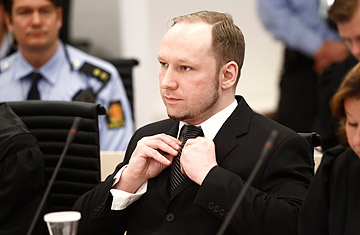
Anders Behring Breivik adjusts his tie in an Oslo court on April 18, 2012
(2 of 2)
Many people in Norway had hoped to bury the ghosts of July 22, 2011. The two-plus months of the trial, however, is going to wrack the country's soul in the name of justice. "This is Norway. We believe in openness and everybody being treated the same," said Kjersti Narud, a psychiatrist, following proceedings inside the court. With two court-ordered psychiatric reports already having reached contradictory conclusions, she admits her profession is also in the dock. The decision of the five judges who have to make the ruling on his sanity will have a profound effect on the judgment meted out.
If Breivik is found to have been sane when he carried out the killings, he can be sentenced to up to 21 years in prison, with a provision to keep him behind bars longer if he is still considered dangerous. If not, he will be held in forced psychiatric care for as long as doctors consider him unwell. Despite his extreme opinions, Breivik's strategy appeared to be to rein in the more fanciful ideas that peppered the 1,500-page manifesto he sent to 8,000 e-mail addresses on the morning of the attacks, removing any mention of the Knights Templar group — an incarnation of the moribund religious groups disbanded in the 14th century — he claims to have co-founded in 2002.
But his confidence faltered. For three days in a row, Breivik had entered the court and issued the same fist-clenched salute, with his right arm stretched out in front of him. But after the prosecution began its arguments, his bravado vanished and he looked up and down from his papers nervously, as prosecutor Inga Bejer Engh read out a section from his manifesto in which he claimed to have been sought out by the revived Knights Templar because of his particular gifts.
The prosecution's strategy has been to depict Breivik as a loser and a fantasist. They have said they do not believe that the Knights Templar exists, and confronted him with sections from his manifesto that talk about trips to Liberia to meet a Serbian war hero and to London to found the militant organization. The counterargument appears to have left him sweating and squirming. "We can just skip this and go to the conclusion," he said. "The police don't think there is a Serb. They don't believe in my British mentor."
As Engh pressed him on why he liked to wear a uniform and confronted him with excerpts from the manifesto that claimed he had been chosen to found the Knights Templar because he was "gifted," Breivik said, "Before you continue, I hope that you will try to ridicule me less and concentrate on the case more."
He fidgeted and sweated as he was forced again and again to admit that the manifesto was "pompous" and badly written. "If I may ask, what is the purpose of this? What are you doing now? What do you want to arrive at? What is the purpose? Your intention is to try to sow doubt into whether this network exists. That is your purpose," said Breivik.
After a lunch break on Day 3, Breivik changed his strategy, refusing to answer many of the questions that hinted at lies in his manifesto. "You have chosen a delegitimization strategy in order to retract credibility from me," said Breivik. "I don't want to make your delegitimization strategy any simpler."
Norway will have nine more weeks of this tug of war with reason.
